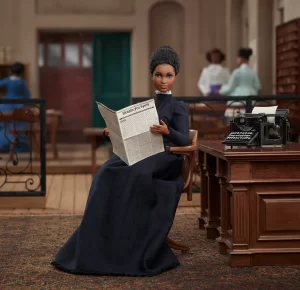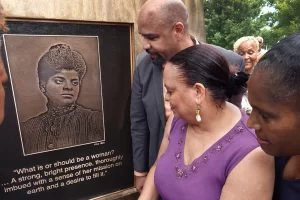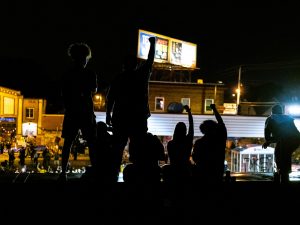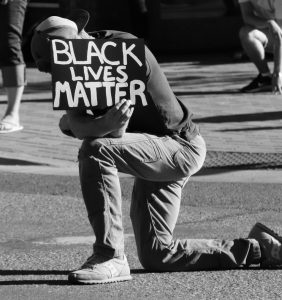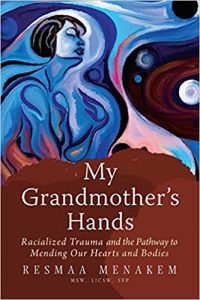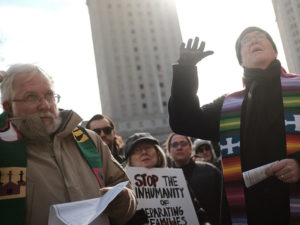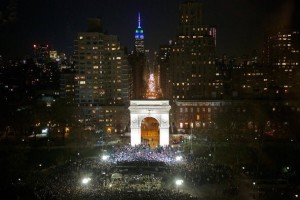Activism
Monday, February 1, 2022
February 1, 2022“There’s a new kind of vaccine on the horizon — and it could help target all coronaviruses, not just Covid-19.” [CNBC]
“The US Army’s “pan-coronavirus” vaccine could protect against any COVID variant.” [CNET]
THE DAILY POSTER
A Potential COVID Game-Changer
BY WALKER BRAGMAN, ANDREW PEREZ
“…U.S. Army’s new pan-coronavirus vaccine recipe is not restricted by intellectual property restrictions and share the information with the world.
According to the Army, early research shows that the Spike Ferritin Nanoparticle (SpFn) vaccine, developed by scientists at the Walter Reed Army Institute of Research, can “provide broad protection” against COVID-19 and future variants. The SpFn vaccine must still undergo Phase 2 and 3 of human trials, but if it proves successful, distributing the new vaccine around the globe could be a game-changer in the fight against the COVID pandemic.
Image: U.S. Air Force Tech. Sgt. Anthony Nelson Jr./Department of Defense via AP
Developed over nearly two years, the vaccine promises efficacy against all variants of the SARS-CoV-2 virus, as well as previous SARS viruses.
Most importantly, the Walter Reed vaccine is being developed directly by public agencies, so there won’t be the same intellectual property issues involved in sharing it as there are with the Pfizer and Moderna vaccines.”
The Independent/UK
James Cromwell: ‘We must speak truth to power – that’s where change comes from’
(Ryan Rogers)
James Cromwell: ‘When you reach a certain age, you have everything taken away from you’
The ‘Babe’ and ‘Succession’ star talks to Adam White about his romantic new role and the importance of continuing to fight against the forces that infantilise older people
“In a conversation that covers everything from politics to pigs to protest, Cromwell’s adoration for weepy British reality shows is a mere aside. But it also gets to the root of him. While he’s played dreadful people before – the corrupt police chief in LA Confidential, a Nazi doctor in American Horror Story: Asylum – he is most often associated with morality, goodness, or gently telling a talking hog, “That’ll do, pig.”
Off camera, whether protesting for animal rights or leading anti-capitalist sit-ins, he is capable only of empathy for society’s most vulnerable. He also sports a kind of eternal youth, an older man still seeing the world through innocent eyes. “To me, I’m 19,” he jokes. “I still make the same 19-year-old mistakes. Hopefully not as many, but just about. Those same dreams and desires still inform everything that I do. And for a funny-looking six-foot-six guy, I haven’t done too badly.”
Cromwell is calling from the log cabin in upstate New York that he shares with his wife, Anna. She owns 13 acres of land, all of which is currently blanketed in winter snow. Cromwell’s brother-in-law lives next door with his family, and performs most of the legwork around the property. “He cuts down the trees and ploughs the meadow, and I just sit here and get fed,” he chuckles.
There is a pragmatism to the way that Cromwell talks about death. He broaches the subject often, unfussily, as if it would be pointless not to acknowledge that it’s nearer than it used to be. But it also feels jarring at times. Cromwell is still visibly passionate about the work he has to do, and his face still bears the twinkly wisdom that made him so endearing in Babe.
Cromwell also liked what Never Too Late [his new film] says about elderly people – who, he says, regardless of their individual capabilities, tend to be infantilised by society and shut off from the world. “When you reach a certain age, they say, ‘That’s it, you’re finished, don’t drive a car, we don’t want to see you any more.’ You have everything taken away from you, and you don’t exist in the world as a viable entity.” He waves his finger at his camera. “Unless you give something back to yourself. You’re still alive, you’re still learning. You can still contribute, you can still make a difference, you can still inspire. And what else is there?”
He was touring the American South with a theatre troupe at the peak of the Sixties civil rights movement, and then got involved with anti-war activism in the Seventies. His work in guerilla theatre – protest plays often performed in public and without permission from the authorities – saw him cross paths with Black Panthers, anti-capitalists, and those opposing sexism, homophobia, nuclear power and environmental cruelty.
“I can’t say I’m a revolutionary because that would mean total commitment. But I’m on the cusp, and my time will come when my voice is required again and my presence will make a difference.” Before we say goodbye, he delivers one last soliloquy down the camera lens – the consummate performer. “Do not go gentle into that good night,” he bellows. “We must rage against the dying of the light!”
Full article; he speaks about his role on Succession and how he helped the creator expand and deepen the part, as well as his activism and the climate crisis.
February 2022 Monthly Forecast
“DISCIPLINE”
Hang in there…..be patient…..wait for right timing…..stay in your own lane.
“This month is all about taking your commitments to the next level of responsible action, staying out of other people’s drama, and trusting the integrity of your intentions to manifest the perfect opportunities when the timing is right. Welcome to the year of the water tiger!
The month starts right out with somewhat glitchy challenges testing our flexibility, will, and resilience for sudden changes manifesting in small setbacks or new opportunities. A new moon in Aquarius on January 31/February 1 sets a stage where anything can happen. Preparedness requires the discipline of staying positive and in your truth no matter what. You can go down the rabbit hole of feeling irritated, self-deprecating, impatient with yourself and others, or simply critical and judgmental about everything. Or, you can be disciplined about being your best self; optimistic, generous, kind, compassionate, accepting, and in gratitude. Not everyone will have this outlook on life, so it is best if part of your discipline this month includes being discerning about where and whom you spend time with.
The distractions of drama, addictive behaviors, overthinking, ambivalence, obsession, blame, and wishing it were different than it is, are all part of ego’s determination to keep you from moving forward into the opportunities you can create for yourself. The discipline is much about not listening to the negative voice that wishes to keep you small and limited. The discipline is also about staying on the path, doing your inner work and persevering in your spiritual practices, self-care and personal growth. By this time, we all know what we need to do to make progress. This month we can engage the discipline needed to follow through.
Discipline is not always fun. We resist it especially when it comes from the outside. This month you will have the opportunity to become your own authority and to activate your own inner discipline guided by personal truth and authentic motivation. You can make it more fun by seeing it as a game to be played between ego and essence. Who will win? Discipline yourself to experience awe and wonder at the eccentricity of life, and to be inspired to engage your creativity in new ways, driven more by your intuition than by the rational mind.
As the water tiger launches a need for action, ready to pounce and leap into the next step, the discipline will be to wait for right timing with patience and to think before you leap. Be spontaneous but not impulsive and give the need for action an outlet through physical movement and disciplined practices.
The third chakra is activated this month as the will to manifest something takes hold. We are all weary of being held back, thwarted in our plans, and more than ready to move forward. Watch Impatience as it can easily turn to Martyrdom if you leap into something before the timing is right.
Finding the balance between being and doing, giving and receiving, masculine and feminine, will and receptivity, generosity and gratitude, and determination and flexibility, is an important factor in navigating the month. Too much of one or the other can cause you to feel off center and irritated. Observe with conscious presence what is affecting you and how. It could be the expectations of others, your own fears, or a misguided sense of responsibility that is throwing you off balance. This is where staying in your own lane becomes a necessary discipline as well as the art of listening to your intuition.”
[Full forecast at powerpath.com]
“Do whatever brings you to life, then. Follow your own fascinations, obsessions, and compulsions. CREATE WHATEVER CAUSES A REVOLUTION IN YOUR HEART.”
-Elizabeth Gilbert
[Thank you for posting, Dr. Charity Dean. -dayle]
Memphis Free Speech
January 11, 2022The new Barbie doll of journalist and activist Ida B. Wells.
Jason Tidwell/Mattel
I had a Skipper and a Scooter. I wish I could have had an Ida B. -dayle
Journalist Ida B. Wells is commemorated with a Barbie doll for fearless activism
NPR
by Elizabeth Blair
Educator, journalist, anti-lynching activist and NAACP co-founder Ida B. Wells joins the pantheon of distinguished women honored by Mattel with her own signature Barbie doll. Resplendent in a deep blue, floor-length dress with lace details, the new Ida B. Wells doll also comes with a historically significant accessory: a miniature replica of the Memphis Free Speech, the newspaper where Wells became editor and co-owner in 1889.
Mattel has created numerous Barbie dolls to honor both historic and contemporary heroines in the hopes of inspiring “generations of girls to dream bigger than ever before.” It’s Inspiring Women Series includes dolls dedicated to Maya Angelou, NASA mathematician Katherine Johnson and singer Ella Fitzgerald.
The oldest of eight children, Ida B. Wells was born into slavery in Holly Springs, Miss., in 1862. When she was 16, both of her parents and a younger brother died during the yellow fever epidemic. Wells raised her younger siblings and became a teacher to support her family.
Daniel and Michelle Duster attend the dedication of a monument to their great-grandmother, journalist, educator, and civil rights leader, Ida B. Wells in Chicago last year.
Scott Olson/Getty Images
“I am honored that Barbie has chosen to celebrate my great-grandmother, Ida B. Wells, as part of its Inspiring Women Series,” says Michelle Duster, author, public historian, and great-granddaughter of Ida B. Wells in a statement. “My great-grandmother was a trailblazer, who courageously followed her convictions and challenged the status quo by fighting for civil rights and women’s suffrage. This is an incredible opportunity to shine a light on her truth and enduring legacy to empower a new generation to speak up for what they believe in.”
A pivotal moment in Wells’ life came in 1883 when she was traveling by train from Memphis to Woodstock, Tenn., where she was a teacher. When she refused to give up her seat and ride in a segregated car, she was forcibly removed. Wells later sued the Chesapeake, Ohio and Southwest Railroad Co. A local court ruled in her favor but the decision was eventually overturned in federal court.
Wells became a fierce anti-lynching activist. She investigated white mob violence and wrote scathing indictments of the lynchings of Black men. Her articles so angered locals, the offices of the Memphis Free Speech were destroyed.
In the preface to her 1892 pamphlet Southern Horrors: Lynch Laws In All Its Phases, Wells wrote, “It is with no pleasure I have dipped my hands in the corruption here exposed. Somebody must show that the Afro-American race is more sinned against than sinning, and it seems to have fallen on me to do so.”
‘Rain without thunder and lightening…’
June 10, 2020The Atlantic
Why Minneapolis Was the Breaking Point
Black men and women are still dying across the country. The power that is American policing has conceded nothing.
Seventeen-year-old Darnella Frazier was on her way out the door to a Memorial Day bonfire on the other side of town when her 9-year-old cousin made a request: Would Frazier walk her to a nearby store? Of course, Frazier replied.
She and her cousin were on their way back home, at the corner of 38th and Chicago, just south of downtown, when Frazier spotted a distraught man sprawled on the pavement. A pile of police officers was holding him down. At least one of the cops seemed to be on top of the man’s neck.
Frazier pulled out her cellphone and hit Record.
Within hours, the whole world had seen the video: Minneapolis police officer Derek Chauvin driving his knee into the neck of 46-year-old George Floyd, not only until Floyd died but for minutes after his life had been extinguished. What came next was a national crisis.
When I first sat down to begin writing this story, parts of many American cities were on fire and police officers in dozens of places were committing indiscriminate acts of violence—unleashing tear gas, rubber bullets, and worse—against the citizenry they had sworn an oath to serve and protect. Elected officials were pleading for peace as parts of their cities burned and the nation, watching in real time on television, asked “Why?”
Decades earlier, there’d been the determined journalism of Ida B. Wells, whose Memphis newspaper was burned to the ground by white supremacists. Wells is best remembered for her crusading work in the 1890s, which not only documented the frequency of southern lynchings but also provided what we’d now consider data analysis in order to disprove the racist lie that lynchings were happening because black men had a particular lust for and inclination to rape white women. Less well known is that Wells also dispatched herself to the scene of cases of police violence, providing essential scrutiny of an equally American strand of homicidal impunity.
“Those who profess to favor freedom, and yet depreciate agitation, are men who want crops without plowing up the ground. They want the WESLEY LOWERY is a Pulitzer Prize–winning journalist and the author of They Can’t Kill Us All: Ferguson, Baltimore, and a New Era in America’s Racial Justice Movement. He is currently a correspondent for 60 in 6, a spin-off of 60 Minutes on the mobile app Quibi.” the former slave Frederick Douglass proclaimed in 1857. “They want the ocean without the awful roar of its many waters.”
“This struggle may be a moral one; or it may be a physical one; or it may be both moral and physical; but it must be a struggle,” Douglass continued, before arriving at a more widely quoted sentence: “Power concedes nothing without a demand.”
Racism is not to blame, the thinking popular among at least some conservatives goes. It’s the people fighting racism who are the problem. If everyone could just stop talking about all of this stuff, we could go “back” to being a peaceful, united country. No one seems to be able to answer when, precisely, in our history that previous moment of peace, justice, and racial harmony occurred.
WESLEY LOWERY is a Pulitzer Prize–winning journalist and the author of They Can’t Kill Us All: Ferguson, Baltimore, and a New Era in America’s Racial Justice Movement. He is currently a correspondent for 60 in 6, a spin-off of 60 Minutes on the mobile app Quibi.
[Full Article]
Educate, learn, listen, align, act.
June 6, 2020Hunger Coalition in Blaine County, Idaho:
‘Speaking out against systemic racism with people across the nation and across the political spectrum aligns with our values, but we must also act on our words. To that end, The Hunger Coalition supports peaceful nonviolent protest and advocacy as a way to:
- Stand up for fundamental American principles of fairness and justice.
- Affect change at the system level.
- Raise awareness around issues that affect the people we serve.
- Honor our values of equity and inclusiveness.
- Speak out against discrimination suffered by people of color, including police brutality.
- Ensure The Hunger Coalition is seen as a safe place for all people to access food, regardless of race, class, gender, sexual orientation, ethnicity, citizenship, disability, or religion.
Please consider joining us in the following actions:
Educate: read, read, and read more about how racial injustice is rampant in every corner of our country. Share what you learn with others.
Demonstrate: peaceful protest is fundamental to our democracy and how we can shine a light on discrimination.
Donate: make a donation to organizations working to heal our nation and bring us all together.
Organize: join forces with people on a shared mission. Petition, canvass, campaign, and put pressure on our leadership to enact change.
Vote: vote for candidates at the local, state, and national level who support policies that make life better for people of color. There is an election on November 3, 2020. Research the candidates and vote.’
-Jeanne Liston, Executive Director at the Hunger Coalition
[Image: Deborah Knapp]
Listen.
Krista Tippet, On Being:
‘…horrific trauma inflicted on black bodies in the “new world” of America — which, as Langston Hughes wrote, “never was America to me.” We are all literally carrying – breathing, reliving, and so repeating — much that didn’t happen to us personally. It’s one way to finally grasp why talking about race, and “teaching our brains to think better” about race, has fallen brutally, tragically short: “The vital force behind white supremacy,” Resmaa Menakem writes in his extraordinary book My Grandmother’s Hands, “is in our nervous systems.”
Resmaa Menakem is a teacher and visionary in this city (Minneapolis), though I only became aware of his groundbreaking work a few months ago. Just before the pandemic sent us into lockdown, I sat across from him in our studio on Loring Park. He watched me as closely as he listened to my words. He caught me bracing at the term “white supremacy,” and taught me that noticing such bracing is exactly where I have to begin to live differently. He’s drawing on knowledge we’re just now gaining about systems and processes in our bodies that we’re only now learning to see: vagus nerve, psoas muscle, trauma, epigenetics. He makes a stunning connection between generations of trauma that white bodies inflicted on each other in the centuries we call the Dark Ages and the generations of horrific trauma inflicted on black bodies in the “new world” of America.
At the On Being Project right now we are listening, and listening again, to Resmaa as well as others who’ve been teaching us in recent years and to whom we will turn for new wisdom in this time. We’re trying to carry our questions with as much humility as we carry what feel like insights and answers.’
An active challenge for the marginalized, oppressed and poor.
January 24, 2019“An individual committed to social justice, inspired & frustrated & impassioned by everything. Everything is political. To think otherwise is a luxury. If you don’t stand for something, you will fall for everything.”
-Anwar Omeish (From the book A Nation of Nations/A Great American Immigration Story (2015), by Tom Gjelten
“To me, Jesus talked about reaching out to the poor, reaching out to the marginalized, reaching out to the oppressed,” says Tara Agnew Harris, 41, who worships at Myers Park Baptist Church in Charlotte, N.C.
“Sometimes, I feel that traditional Christian beliefs have been hijacked,” she says. “I think many people in the United States, when they hear about ‘Christian beliefs,’ they think it has something to do with a certain fundamentalist mindset.”
“The way that I personally interpret my Christian faith and my own Christian walk,” she says, “is that it’s an active challenge. [It’s about] how I can make a difference in the lives of others.”
“We’re working with Muslims and Jews and Sikhs and every sort of faith group,” Butler says. “We all have the same core values in mind, which is that everybody is created in the image of God, and we need to love our neighbors as we love ourselves.”
It was religious leaders who drove the abolitionist movement in the 19th century and the civil rights movement in the 20th century.
“I think religion helps people understand who they should be,” Butler says.’
“The nation is in need of “moral defibrillators” to work on its weak heart.”
-Rev. Dr. William Barber
14.4 Minutes
August 4, 2018Mother Lea at Emmanuel Episcopal in Hailey, Idaho reminds us that 1% of a 24 hour day is 14.4 minutes. If we use that time every day to be a ‘lamp, lifeboat, or ladder [Rumi] we will create change.
Today I rise.
November 29, 2016
Beyond hope.
November 26, 2016Derrick Jensen/Orion Magazine
“…life is really, really good. I am a complex enough being that I can hold in my heart the understanding that we are really, really fucked, and at the same time that life is really, really good. I am full of rage, sorrow, joy, love, hate, despair, happiness, satisfaction, dissatisfaction, and a thousand other feelings. We are really fucked. Life is still really good.”
—
Hope is what keeps us chained to the system, the conglomerate of people and ideas and ideals that is causing the destruction of the Earth.
False hopes bind us to unlivable situations, and blind us to real possibilities.
Things will not be okay. They are already not okay, and they’re getting worse. Rapidly.
To hope for some result means you have given up any agency concerning it. […] They’ve stepped away from their own ability to participate in stopping it.
We simply do the work.
I am a complex enough being that I can hold in my heart the understanding that we are really, really fucked, and at the same time that life is really, really good. I am full of rage, sorrow, joy, love, hate, despair, happiness, satisfaction, dissatisfaction, and a thousand other feelings. We are really fucked. Life is still really good.
When you give up on hope, you turn away from fear.
And when you quit relying on hope, and instead begin to protect the people, things, and places you love, you become very dangerous indeed to those in power.
In case you’re wondering, that’s a very good thing.
He changed the debate.
April 15, 2016This is the political revolution – – 27,000 people rally for BERNIE in New York City.
- Get out the VOTE.
- Protect voting rights.
- Rid politics of big money.
Whatever happens at the conventions, or in November, one guy changed the debate and activated hundreds of thousands young voters to mobilize, protect voting rights, and get big money out of politics.
Forward.





